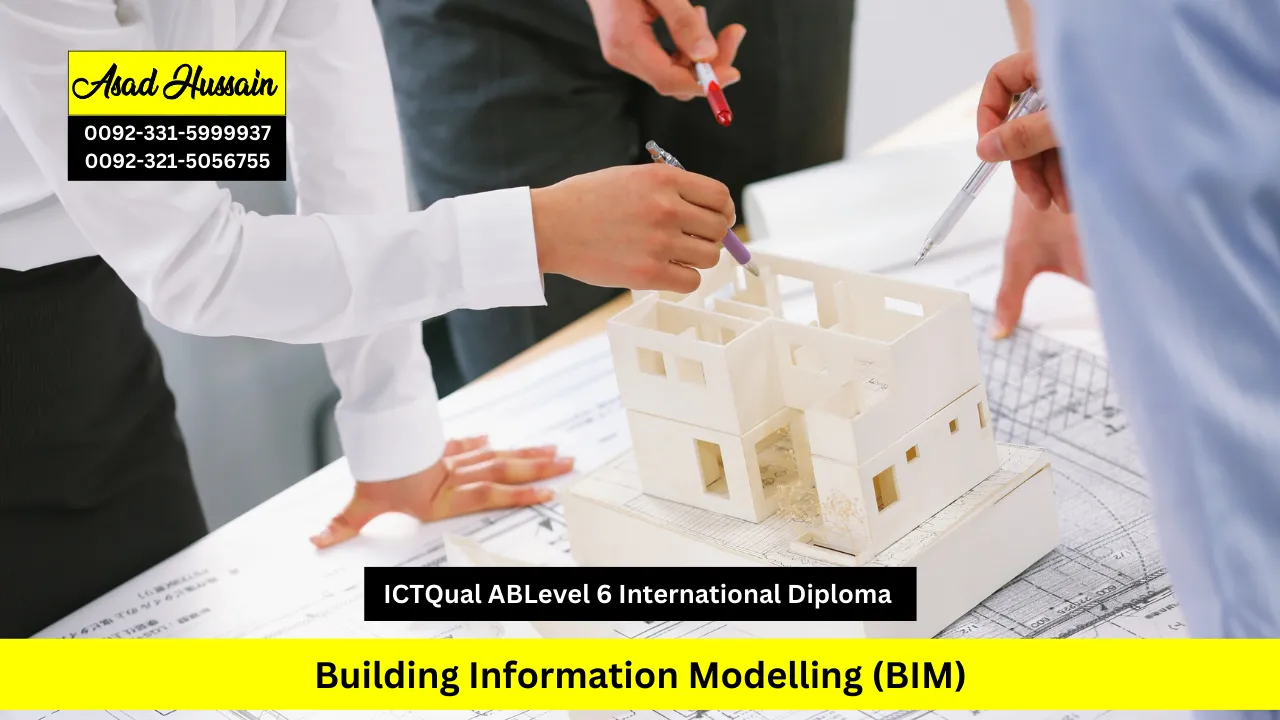Building Information Modelling (BIM) has revolutionized the construction and engineering industries, enabling efficient project planning, collaboration, and lifecycle management of building projects. The ICTQual AB Level 6 International Diploma in Building Information Modelling (BIM) provides learners with the advanced skills and knowledge required to design, manage, and coordinate digital building models effectively, ensuring high-quality outcomes and operational efficiency.
ICTQual ABLevel 6 International Diploma in Building Information Modelling (BIM) covers the principles and applications of BIM, including 3D modelling, clash detection, project coordination, cost estimation, sustainability, and integration with project management processes. Learners will gain practical experience in using BIM software, interpreting digital models, and collaborating with multidisciplinary teams, allowing for more accurate planning, reduced errors, and cost savings.
Through a combination of theoretical instruction, case studies, and hands-on exercises, participants will develop competencies in digital construction project management, collaborative workflows, and data-driven decision-making. Graduates will be prepared for roles in architectural, engineering, and construction (AEC) firms, project consultancy, and infrastructure management globally. Completing ICTQual ABLevel 6 International Diploma in Building Information Modelling (BIM) enhances career prospects, strengthens professional credibility, and equips learners with internationally recognized skills essential for modern construction and engineering projects.
Program Highlights
Study Units
Year 1 – Foundation in Building Information Modelling (BIM)
- Principles of Building Information Modelling
- Introduction to Digital Construction Projects
- Construction Materials and Methods for BIM
- Project Planning and Scheduling in BIM
- Risk Assessment and Management in Digital Projects
- Health, Safety, and Environmental Awareness
- BIM Communication and Stakeholder Management
- Construction Technology Fundamentals
- Financial Management in BIM Projects
- Quality Assurance and Control in BIM
- Legal and Regulatory Frameworks in Construction
- Professional Ethics and Conduct in Digital Construction
Year 2 – Intermediate BIM Practices
- Advanced BIM Modelling Techniques
- Resource Management and Allocation in BIM Projects
- Project Cost Estimation and Budgeting using BIM
- Construction Contract Administration in Digital Projects
- Procurement and Supply Chain Management in BIM
- Project Risk Analysis and Mitigation
- Leadership and Team Management in BIM Environments
- Site and Workshop Management with BIM Integration
- Sustainability and Environmental Management in BIM Projects
- Project Monitoring and Reporting using Digital Tools
- Problem-Solving and Decision-Making in BIM Projects
- Communication and Negotiation Skills in Digital Construction
Year 3 – Advanced BIM and Strategic Leadership
- Strategic BIM Management in Construction Projects
- Advanced Construction Project Design with BIM
- Infrastructure Project Management using BIM
- Innovation and Emerging Technologies in BIM
- Advanced Risk and Crisis Management in Digital Projects
- Contract Management and Legal Compliance for BIM
- Leadership in BIM-Driven Construction Projects
- Advanced Project Control and Performance Measurement
- Project Governance and Compliance in Digital Construction
- Research Methods and Project Analysis for BIM
- Capstone Project in Building Information Modelling
- Professional Development and Career Planning
To ensure learners are fully prepared for the ICTQual AB Level 6 International Diploma in Building Information Modelling (BIM), specific entry requirements have been established. These requirements ensure that candidates possess the necessary educational background, technical skills, and language proficiency to engage effectively with advanced BIM concepts and applications in real-world construction and engineering projects.
Age Requirements
- Applicants must be 18 years or older to enroll in ICTQual ABLevel 6 International Diploma in Building Information Modelling (BIM).
- Mature learners over 21 years are encouraged, especially those seeking professional development in digital construction management.
Educational Requirements
- Candidates should hold a Level 5 qualification or equivalent in construction, architecture, civil engineering, or a related discipline.
- Relevant diplomas, technical certifications, or prior experience with construction or design software may also be considered.
Professional Experience
- Work experience in construction, architecture, project management, or digital modelling is preferred.
- Practical experience with CAD, project coordination, or design workflows enhances the application of BIM concepts.
English Language Proficiency
- Non-native English speakers must demonstrate proficiency through recognized tests such as IELTS 6.0 or equivalent.
- Effective English communication is essential for completing assessments, preparing project documentation, and collaborating in multidisciplinary teams.
Meeting these entry requirements ensures learners are fully prepared to gain the maximum benefit from the course. By enrolling in ICTQual ABLevel 6 International Diploma in Building Information Modelling (BIM), participants will acquire the advanced knowledge, practical skills, and professional credibility required to excel in BIM, manage digital construction projects efficiently, and contribute strategically to modern construction and engineering initiatives globally.
The ICTQual AB Level 6 International Diploma in Building Information Modelling (BIM) equips learners with advanced technical knowledge, digital skills, and project management expertise to excel in the evolving construction and engineering sectors. Graduates will be able to plan, design, and manage construction projects using BIM tools, ensuring efficiency, accuracy, and collaboration across multidisciplinary teams.
Year 1 – Foundation in BIM
Principles of Building Information Modelling (BIM)
- Understand the fundamental principles and benefits of BIM in construction and engineering projects.
- Apply BIM concepts to basic project modelling and digital documentation.
- Demonstrate knowledge of industry standards and regulatory frameworks for BIM.
- Develop initial competency in using BIM software for project planning.
Introduction to Construction Projects
- Recognize different types and phases of construction projects.
- Analyze project objectives and requirements for effective planning.
- Apply project management tools to support project workflows.
- Develop foundational skills in collaboration and project coordination.
Construction Materials and Methods
- Identify properties, uses, and performance of construction materials.
- Apply appropriate construction methods in digital project models.
- Evaluate the impact of material selection on project cost, quality, and sustainability.
- Develop practical problem-solving skills related to construction processes.
Project Planning and Scheduling
- Create project schedules using standard planning tools and BIM software.
- Allocate resources effectively to meet project milestones and deadlines.
- Monitor progress and adjust plans to ensure on-time delivery.
- Evaluate scheduling strategies for efficiency and productivity.
Health, Safety, and Environmental Awareness
- Understand health, safety, and environmental standards in construction projects.
- Apply safe working practices in digital and real-world project scenarios.
- Assess environmental impacts and implement mitigation strategies.
- Integrate sustainability principles into project planning and management.
Year 2 – Intermediate BIM Practices
Advanced BIM Modelling Techniques
- Develop complex 3D models using advanced BIM software features.
- Apply clash detection and model coordination techniques to identify issues.
- Ensure accuracy and consistency of digital project data.
- Integrate multidisciplinary inputs into cohesive project models.
Cost Estimation and Budgeting Using BIM
- Prepare accurate cost estimates from BIM models.
- Apply digital tools for quantity take-offs and cost management.
- Monitor budgets and forecast financial performance throughout project phases.
- Evaluate cost data to support strategic project decision-making.
Project Risk Analysis and Mitigation
- Identify and assess risks in construction and BIM projects.
- Develop mitigation strategies using digital tools and project data.
- Monitor and adjust risk management plans as projects progress.
- Evaluate the impact of risks on cost, schedule, and quality.
Collaboration and Communication in BIM Projects
- Facilitate communication between multidisciplinary teams using BIM platforms.
- Produce clear reports, visualizations, and presentations from BIM models.
- Implement collaborative workflows and data sharing standards.
- Resolve conflicts and ensure alignment across project stakeholders.
Leadership and Team Management
- Lead BIM project teams effectively using digital project management tools.
- Motivate team members and resolve conflicts efficiently.
- Evaluate team performance and implement improvements.
- Apply professional ethics and standards in project leadership.
Year 3 – Advanced BIM and Strategic Leadership
Strategic BIM Project Management
- Develop strategic project plans integrating BIM methodologies.
- Apply advanced project management frameworks to large-scale digital projects.
- Monitor performance metrics and ensure project objectives are met.
- Implement strategies for efficient, cost-effective project delivery.
Innovation in Digital Construction
- Apply innovative BIM tools and technologies to enhance project efficiency.
- Implement sustainable and smart construction solutions.
- Evaluate the impact of digital innovation on project quality, cost, and collaboration.
- Foster creativity and problem-solving in project workflows.
Advanced Risk and Crisis Management
- Identify complex risks and potential crises in construction projects.
- Develop proactive response and mitigation strategies.
- Lead teams effectively during critical project challenges.
- Monitor and continuously improve risk management strategies.
Capstone Project in BIM
- Plan, design, and execute a comprehensive construction project using BIM tools.
- Demonstrate practical application of knowledge and skills acquired throughout the program.
- Produce professional project documentation, cost reports, and digital models.
- Present project outcomes and recommendations effectively to stakeholders.
Professional Development and Career Planning
- Develop a personal roadmap for career growth in BIM and digital construction management.
- Identify opportunities for specialization and continuous professional development.
- Reflect on strengths, skills, and areas for improvement.
- Prepare for leadership roles and internationally recognized professional certification.
Upon completing ICTQual AB Level 6 International Diploma in Building Information Modelling (BIM), learners will possess advanced technical knowledge, practical BIM skills, and leadership capabilities, enabling them to manage complex construction projects, optimize resources, implement sustainable practices, and excel as highly employable professionals in digital construction management.
The ICTQual AB Level 6 International Diploma in BIM is designed for professionals, students, and career-focused individuals seeking advanced expertise in digital construction project management. ICTQual ABLevel 6 International Diploma in Building Information Modelling (BIM) is ideal for learners aiming to enhance their technical, managerial, and collaborative skills in BIM, enabling them to excel in modern construction, architecture, and engineering environments.
Educational Instructors and Trainers
- Deliver training programs on BIM applications, digital construction workflows, and project management standards.
- Develop practical exercises, workshops, and case studies to build learners’ expertise in BIM.
Environmental Advocates and Activists
- Integrate sustainable, ethical, and environmentally responsible practices into BIM-enabled construction projects.
- Influence organizational practices to minimize ecological impacts while ensuring project efficiency.
Students and Recent Graduates
- Acquire in-depth knowledge of BIM principles, digital construction workflows, and project management.
- Develop practical competencies to pursue careers in digital construction, architecture, and project consultancy.
Career Changers
- Transition into digital construction management, BIM coordination, or consultancy roles with a recognized Level 6 qualification.
- Gain strategic, operational, and technical skills to enhance career prospects and employability.
Policy Makers and Regulators
- Develop, evaluate, and enforce policies and regulations for BIM implementation and digital construction standards.
- Promote accountability, sustainability, and compliance in modern construction practices.
ICTQual ABLevel 6 International Diploma in Building Information Modelling (BIM)is ideal for learners seeking to lead, innovate, and excel in digital construction management. Graduates will emerge as competent, strategic, and professional leaders capable of delivering high-quality BIM projects, managing multidisciplinary teams effectively, and contributing to the advancement of modern construction practices globally.







